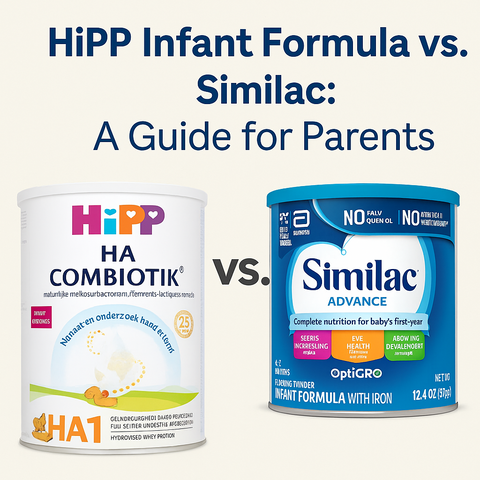Gassy Baby? Learn about the Causes, Symptoms and Remedies
Hey there, new parents! Welcome to the world of babyhood, where every day brings something new. Including the unexpected world of baby gas ;). Yep, we're talking about those little toots and burps that come with having a tiny human in your life.
Imagine this: you're snuggling your baby, enjoying a quiet moment, when suddenly, a teeny tiny toot escapes. Surprise! You've just experienced your baby's first gas moment. It might make you laugh or raise an eyebrow, but it's all part of the package.
But how do you know if those gas sounds are just a normal part of baby life or if they're causing discomfort? Let's break it down together and figure out what's happening with your little one's tummy.
Please Note:
If you're concerned about your baby's gas or discomfort, don't hesitate to consult with your pediatrician for guidance and support.
Causes for baby gas
Gas troubles often start right away or when babies are just a couple of weeks old. Fortunately, most infants outgrow them by the time they're 4 to 6 months old, though baby gas can last longer for some.
The digestive system of your baby was not used while in the womb. This all kick starts when they get born. Newborn digestive systems are immature, so they produce a lot of gas. Infants also take in a lot of air while feeding and crying, which produces more gas. A gassy baby is thus very normal. While the digestive system matures, babies tend to pass gas 13-21 times a day. Yes, that is a whole lot and a normal part of development!

Here are some causes of gassiness:
- Swallowed Air: Babies are pros at swallowing air, especially during feeding times, whether it's from bottle-feeding or breastfeeding.
- Immature Digestive System: Your baby's digestive system is still learning the ropes, which means it can sometimes struggle to break down certain foods, leading to gas.
- Overfeeding: Sometimes, a baby's eyes can be bigger than their stomachs, leading to gulping down more milk or formula than they can handle, which can result in gas.
- Lactose Sensitivity: Some babies may have trouble digesting lactose, the sugar found in milk, which can cause gas and discomfort.
- Formula Choice: Different formulas can affect babies differently. Some may be harder to digest, leading to more gas.
- Fast Let-Down: For breastfeeding moms, a fast let-down of milk can lead to babies swallowing more air while trying to keep up.
- Food (Hyper) Sensitivities: If you're breastfeeding, certain foods in your diet could be causing gas in your baby, especially if you're consuming a lot of gas-inducing foods yourself.
Signs of a gassy baby
Generally, when a baby is suffering from gas, it means that their stomach is inflated with air. Your little one can have gass that refuses to pass and this can make him/her fussy and genuinely uncomfortable. The gas and related issues can start from the first few feedings and can last through to the toddler stage. Most babies experience a peek when they are between 4 and 12 weeks old. This is the period the digestive system changes and matures the most. So, how do you know if your baby is feeling gassy and what are the signs? :
- Fussiness: If your baby seems unusually irritable or fussy, especially after feeding, it could be a sign of gas discomfort.
- Crying: Persistent crying, especially with legs pulled up to the chest or a tight, distended belly, might indicate gas pains.
- Squirming and Clenching: Your baby may squirm, arch their back, or clench their fists or legs in an attempt to alleviate gas discomfort.
- Difficulty Sleeping: Gas pains can make it challenging for babies to settle down for naps or bedtime, leading to disrupted sleep patterns.
- Burping and Passing Gas: Excessive burping or passing of gas, along with a gassy or bloated tummy, can be indicators of trapped gas in your baby's digestive system.
- Changes in Feeding Patterns: If your baby starts to feed more frequently or refuses to feed altogether, it could be due to gas discomfort.
- Facial Expressions: Watch for grimacing or expressions of pain on your baby's face, particularly during or after feeding sessions.
It can feel quite overwhelming when your little one is fussy and experiencing tummy trouble all the time. Just remember, it is a phase, it will pass and your little once body is working hard to grow and become strong.
Best Remedies For Baby Gas Relief

If your baby's tummy troubles seem to be a problem, here are some tips to avoid that gas from building up:
- Burping: A lot of newborn discomfort is caused by swallowing air during feedings. Burp your baby frequently during and after feedings to help release trapped air from their stomach.
- Gentle Massage: Gently massage your baby's tummy in a clockwise motion to help move gas along the digestive tract and provide relief.
- Bicycle Legs: Lay your baby on their back and gently move their legs in a cycling motion to help alleviate gas pressure.
- Tummy Time: Encourage regular tummy time sessions when your baby is awake and supervised, as this can help improve digestion and relieve gas discomfort.
- Warm Bath: A warm bath can help relax your baby's muscles and ease gas pains. Just make sure the water is comfortably warm, not too hot.
- Simethicone Drops: Though they don't work for every baby, infant gas drops are generally considered safe for babies. Over-the-counter simethicone drops can help break up gas bubbles in your baby's stomach, but always consult with your pediatrician before using any medication.
- Adjust Feeding Technique: If you're bottle-feeding, try using a slower flow nipple to reduce the amount of air your baby swallows. For breastfeeding moms, ensure a proper latch to minimize air intake.
- Gas-Relief Formula: Consider switching to a specially formulated gas-relief formula if you suspect that your baby's discomfort is related to feeding.
- Formula with Probiotics: Some parents find that probiotic supplements can help regulate their baby's digestive system and reduce gas. However, consult with your pediatrician before giving any supplements to your baby.
- Monitor Your Diet: If you're breastfeeding, be mindful of your own diet, as certain foods may contribute to gas in your baby. Keeping a food diary can help identify potential triggers.
Always consult with your pediatrician before trying any new remedies or treatments for your baby's gas discomfort, especially if you have concerns about their health or well-being.
Formula for gassy baby
Is your little one constantly gassy, or struggling to pass gas? The products in this collection are carefully formulated to help ease your baby’s digestion.
HiPP has developed a special formula to help relieve with gassiness, bloating and digestive discomforts that many babies struggle with. The special formula from HiPP is called HiPP Comfort.
If your baby is struggling with gassiness, bloating or digestive discomfort HiPP Comfort can help. HiPP Comfort German All-Stages is a gentle, easy-to-digest formula suitable for babies of all ages, including older babies and toddlers who have begun eating solid foods. Comfort is designed with a reduced lactose content, offering relief from common issues such as colic, constipation, bloating, and gas. For little ones with a sensitive digestive system, it can loosen the baby's stool and regulate bowel movements through its unique formulation. HiPP Comfort's unique blend of maltodextrin and starch results in a creamy texture that helps keep your baby full and content after feedings.
Conclusion
Whether it's mastering the art of burping, indulging in gentle massages, or embracing tummy time, there's a repertoire of tricks to alleviate gas discomfort. And if you find yourself in need of extra support, innovative formulas like HiPP Comfort are tailored to soothe gassiness and digestive woes.
So, as you embark on this joyous journey filled with laughter, love, and yes, a few unexpected toots, remember: it's all part of the magical world of babyhood. And with each passing gas bubble, your little one is growing, thriving, and filling your heart with endless delight! ;)
Contact
Please contact our dedicated customer support team for expert formula advice and guidance tailored to your baby's needs. They have earned hundreds of 5-star reviews from our customers, helping you to provide the best nutrition for your little one. Contact us here or shoot us an email at support@organicformulashop.com. We're here to help!
Please Note:
The information provided in this article is for educational and informational purposes only. It is not intended as a substitute for professional medical advice, diagnosis, or treatment. Always seek the advice of your qualified healthcare provider with any questions you may have regarding a medical condition or the health and well-being of your baby.





